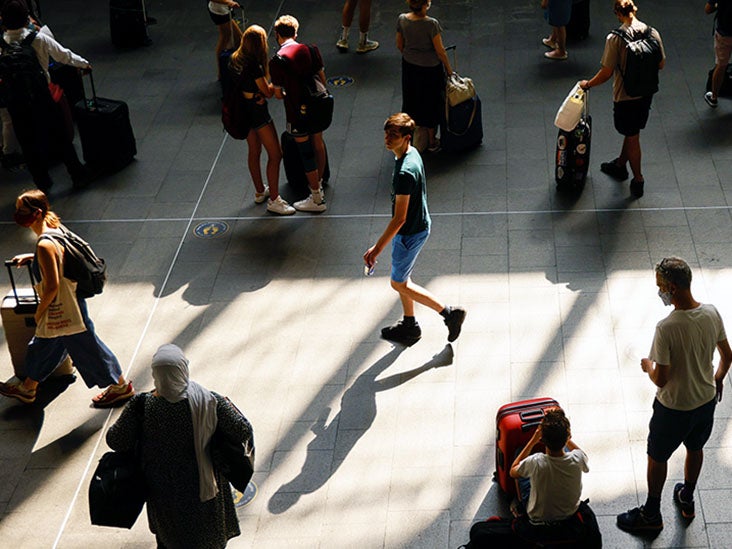
- Other strains of human coronaviruses, such as those that cause the common cold, circulated through the human population before the emergence of SARS-CoV-2, which is responsible for COVID-19.
- Understanding the immune response to coronaviruses that existed before the pandemic and the current SARS-CoV-2 virus may be a gateway to better understanding protective immunity to COVID-19.
- A recent study asks whether exposure to pre-pandemic coronaviruses might protect against COVID-19.
Scientists at the University of Zurich (UZH) in Switzerland recently performed an analysis demonstrating a higher level of immunity against COVID-19 in people who had been exposed to coronaviruses circulating before the pandemic.
Prof. Alexandra Trkola, lead researcher and head of the Institute of Medical Virology at UZH, and her colleagues reported their findings in
The study monitored antibody response to SARS-CoV-2 to uncover correlations with vaccine protection, disease severity, and susceptibility to infection.
The researchers also compared immune responses against SARS-CoV-2 with those against pre-pandemic coronaviruses, known as HCoVs. The
“Our study shows that a strong antibody response to human coronaviruses increases the level of antibodies against SARS-CoV-2. So someone who has gained immunity to harmless coronaviruses is therefore also better protected against severe SARS-CoV-2 infections,” says Prof. Trkola.
When an immune response against one coronavirus creates immune protection against a different virus, health experts call it cross-reactivity.
The researchers analyzed serum samples from 825 participants taken before the pandemic, and assessed their immune responses to four of these HCoVs.
They also analyzed 389 serum samples from individuals who tested positive for SARS-CoV-2.
The scientists found that the people who contracted SARS-CoV-2 had lower levels of antibodies against HCoVs than the individuals who did not contract SARS-CoV-2.
Also, the people with higher levels of antibodies against HCoVs who did contract SARS-CoV-2 were less likely to need hospital treatment.
Rachel Roper, Ph.D., a professor of microbiology and immunology at East Carolina University in Greenville, NC, told Medical News Today:
“I suspected that preexisting immunity to other human coronaviruses that cause colds would affect responses to SARS-CoV-2, but we didn’t have the data until now. These researchers show convincing evidence that preexisting immunity to other human coronaviruses gives some protection against infection with SARS-CoV-2, as well as [the] development of severe disease.”
“These data partly explain why some individuals have very mild or asymptomatic infections, while others develop severe disease,” she continued.
Dr. Roper went on to say, “In addition, the data show that having an immune response to other coronaviruses helps increase the immune response to COVID-19 vaccines.”
Beyond the antibody response, she explained how “these data also suggest that T lymphocytes may respond similarly and provide some level [of] cross-protection.”
“Of course, immune responses targeting SARS-CoV-2 that are mounted by the
B lymphocytes — a type of white blood cell —
People’s immunity to SARS-CoV-2 is most robust soon after recovering from an infection or receiving a vaccination. This immunity occurs when antibody levels against the virus are still high. As these levels begin to drop, protection against the virus diminishes.
At this point, the process known as immunological memory can quickly reactivate the body’s production of antibodies and T cells and confer renewed immunity against the circulating viruses.
Dr. Roper went on to say, “These data give us a reason to be grateful for catching the colds caused by the other human coronaviruses!”
Whether the cross-reactivity of antibodies on antigens revealed in this study works in the opposite direction is still unknown. Does immunity to the SARS-CoV-2 virus also confer immunity against weaker forms of the coronavirus?
MNT spoke with Dr. David Smith, MAS, FACP, from University of California San Diego Health in La Jolla, who discussed the study’s clinical implications. He stated, “It’s hard to directly interpret these data through a clinical lens. The study does suggest that more related coronavirus immunity helps with SARS-CoV-2 immunity.”
“This gives me hope that COVID-19 vaccines should continue to help protect [against] variants that continue to develop, but, of course, clinical studies will need to assess such speculation and hope.”







More Stories
The Layers of CMMC Compliance with a CMMC Consultant’s Aid
Fairy House: A Journey into the Magical World of Miniature Dwellings
How to promote your trips to Baku on social media